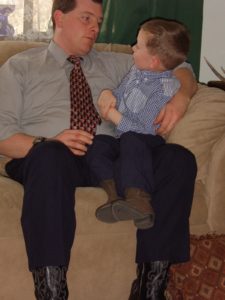
I know it is incredible, but I have been in the kitchen before. Not just raiding the refrigerator or getting a drink. I have cooked. Yes, my abilities exceed cooking grilled cheese and hotdogs. I even figured out how to modify meatloaf into a dish I call “Italian meatloaf.” (Hint: it includes ground meat, cheese, ketchup, and Italian seasonings) Because I am a guy, I even figured out how to cook this in the microwave. When I am hungry, I don’t have two hours to spend cooking. I can cook, but that only means that I can keep myself from starving when I am home alone. It does not mean that I eat well or should be relied on to cook for others. I must admit that usually, if I am in the kitchen, I prefer baking, not cooking.
My wife is thrilled by the fact that I clean up after I use the kitchen. She enjoys the things I cook or bake. However, it seems to bother her that I get very consistent results with whatever I am baking. I watched my wife one day and discovered why my results were more constant than hers. I measure everything meticulously. If the recipe calls for one cup, I measure precisely one cup and not a speck more or less.

When she bakes, she uses rough measurements. Her baking includes pouring the ingredient directly from the canister into the mixing bowl and estimating how much is there. Most recipes are forgiving enough that her method works with slight variance in results. There is one cake that I am the only one of us who can bake it successfully. I view the recipe as the instructive laws governing the final result. She considers the food formula as helpful and suggestive information pointing you in the general direction.
I have found that living in God’s shadow requires us to follow the recipe that He laid out for us in the Bible. Exodus 20 gives us the Ten Commandments, which tell us the requirements to live a life pleasing to God. The instructions in 2 Chronicles 7:14 tells us how to live in God’s shadow. Jesus summed up both when He said, ” ‘You shall love the Lord your God with all your heart, and with all your soul, and with all your mind.’ This is the greatest and first commandment. And a second is like it: ‘You shall love your neighbor as yourself.’ On these two commandments hang all the law and the prophets.” Matthew 22:37-40 (NRSV) Following this recipe precisely is imperative.

Following the specific order that recipes generally are written in is very important. One cake recipe I have used calls for boiling water or coffee to be stirred into the other ingredients just before putting it into the oven. If I added the boiling water at the beginning or forgot it, the cake would not turn out.
Reading through the Ten Commandments, I notice that keeping the first two commandments enables one to keep all the rest possible. The only way to complete this recipe is to follow the order.
When following a recipe, I have found that it is necessary to put in all the ingredients. God wants us to apply the formula for living in His shadow to every part of our lives. Attempting to skip or alter the parts of the recipe never ends well. Even if parts of the prescription are uncomfortable for us, we must follow it. Imagine if I tried to bake my favorite chocolate cake and then decided to substitute mashed peas for the cocoa powder and used orange juice to replace the boiling water. Does anybody want some of this cake?
I find it very interesting that we will take a recipe at its word. We will follow it exactly, hoping for a mouthwatering final result. Why do we consider the method God gives us to be different? Many times we only want to follow the commands that are easy and comfortable for us. Why do we try to claim to live in God’s shadow if we are unwilling to comply with the instructions on how to get there laid out in 2 Chronicles 7:14? I do not write this as a master of the recipe, but as one who is trying to follow it and challenge others to pursue it. The goal is to enhance our relationship with God, not to seek to outperform other people. God was not attempting to make things difficult by giving us instruction. He was trying to make it easier for us by providing clear directions on living in His shadow.

I challenge you to pursue God. Follow His recipe. Live in His shadow. Encourage others as they attempt to follow God’s recipe for a close relationship with Him.










